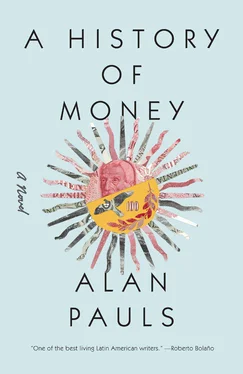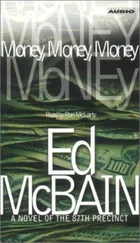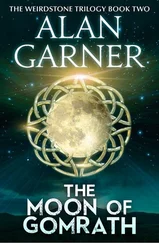And so when he goes to his father’s apartment, it’s not really to clean, as he tells the doorman when he bumps into him in the lobby, nor to get his father’s few possessions in order, as he tells his mother, nor to fill the two industrial-size trash bags he takes with him with all the things that need to be thrown out, but rather to find proof that the debt existed. The apartment is filthy. He can tell it is as soon as he gets inside and starts groping his way through the darkness, feeling a little uneasy — he’s only now realizing how foreign this space is to him, how infrequently he came here to visit his father — and smelling the rancid perfume of confinement and damp wood — ah, his father’s passion for wood, which was almost as fervent as his feelings about paper — as well as a harsh odor like old wool that gets inside his nose and tickles it. He lifts the blind halfway, until something blocks it and the cord suddenly stops dead in his hands: yellowish walls, a whole baseboard of accumulated grime, the floors stained and carpeted with dust. A cockroach scurries away, its body slightly tilted. He crushes it under his foot and a galaxy of corpuscles shatters in the air and dances in the ray of sunlight shining through the window. His father is dead and the sun is shining through the window.
He opens the fridge, finds the half lemon and the limp lettuce sitting alone on the cracked glass shelf, as orphaned as he is, and looking at him with an air of irritation that suggests he’s just interrupted an intimate scene, and closes it without touching them. He will never touch them, not even when the time comes to get rid of the fridge, when a neighbor buys it for spare change, along with some old speakers, an adjustable nightstand, a weighing scale, a Continental typewriter, and an unused nutcracker with the price sticker still on it — a lot the neighbor puts together himself after inspecting the apartment in a professional sort of way and carries away on his back as casually as if it were a bag of feathers. If he could put a date on this filth, he thinks, he could also date the moment his father started to die. It’s not when he’s taken into hospital; not the diagnoses or the operations or the secret diet of whiskey and pretzels he shares with his poker rival at the hospital on a few of his nights there. It happens while he’s still in his apartment, in possession of all his faculties, and surrounded by the minimal cast of objects now surrounding him — things he didn’t even want or choose, things that had belonged to his mother, for example, which he never had the courage to throw out and so dragged from one year and one apartment to the next, and which survived it all and ended up prevailing over him — the moment he looks around with his hands on his hips and decides he won’t clean, that it’s not worth it. And falls into his TV chair. That’s when his father starts to die.
Everything is dirty but in its place. Dust and order are only incongruous in living things. They always come hand in hand in those approaching death. Records in alphabetical order by artist, the same as the books. The first hangers for coats, the next for jackets, the last for pants, never mind that every garment has the coarse texture of objects that nobody has touched for years — a covering of filth that sticks to the fingertips like wax. He finds his notebooks on the coffee table, at an angle to the corner. There’s a trail of semicircles and parentheses printed on the wood leading up to them, marks left by wet glasses and cups, the universal symbols of neglect. He opens the first one excitedly, hoping to find his father’s handwriting, the strange mixture of upper and lower cases with random serifs that look like loose threads, always leaning to the right and growing gradually smaller, as though something were crushing his hand as it moved — handwriting that he’s never liked but which he nevertheless copied for a long time, even though his teachers and his girlfriends, who were apparently incapable of deciphering his essays or making out the names and numbers on the notepads next to the phone, reproached him for it on countless occasions.
He finds figures. Or rather they leap into view, insects hungry for a three-dimensional life they might have been dreaming of for years. Series, strings, whole columns of numbers that start on the first line, aligned to the left, and carry on line after line to the bottom of the page, then go up and start at the top again, like echoes of the column just completed, then carry on again to the bottom of the page and start again on the first line, to the right of the column they’ve just finished, and so on for pages and pages. Every now and then there’s a variation that turns the page into a kind of extraordinary oasis, a vision of graphic freshness: shorter columns, with accompanying words that allow him to decipher them — words like “travel costs” and “extras,” like “income” and “expenditure,” words like “Enrique,” “electricity,” “tips.” From time to time there’s a loose sheet slotted in, a letter on letterhead, folded diary pages, Post-its, bar napkins, flyers from the street, discoveries that gleam with promise for a moment, and which he pounces on excitedly before putting them back again, sadly, as soon as he realizes that they haven’t escaped the awful reach of these accounts: expenses from a weekend in Tigre written on the back of a flyer from a riverside grill, an inventory of outstanding payments on an envelope from a large hotel, a list of commissions earned over the course of a month on the rectangular card of a bookmark. From the first page to the last, from the first notebook to the last — there are seven, all the same brand and bought in the same place, an old bookshop near the courthouses — the figures grow smaller and more pinched, filling the empty passages that had made it possible to distinguish them, determined to colonize every last bit of space with their swarming. Finally, in the last notebook, the only spiral-bound one, the columns twist and brush against one another, the numbers are illegible, the pages skies full of backlit locusts.
Sitting there on the arm of the TV chair, leaning over those seven open notebooks, he cries all the tears he didn’t cry at the hospital, or at the funeral, or on the afternoon almost a week later when he suddenly gives a worried start in his kitchen while making coffee, as though remembering something important that slipped his mind too long ago, and thinks, “I have to call my father!”—and in that same moment the evidence that he’s dead forces itself upon him. The apartment is so quiet that he can hear every tear hitting the paper. The numbers shatter and blur into blackish, reddish, violet-tinted streaks that tremble and ripple gently for as long as it takes the paper to absorb them, and are then still. He remembers a scene from a film about the life of Chopin: the gradual, delicate dripping of real pulmonary blood that splatters the keys while he passionately attacks them. For a moment he marvels once more at his father’s pride and belligerent boastfulness in proclaiming that he’s never had a bank account and never used checks, that he flat-out rejects every credit card offer he receives, even the most advantageous ones — the worst of all, he says, faithful as ever to the principle that evil is never as ruthless as when it wears a benevolent face. He doesn’t want to be controlled by money. He doesn’t want to see his life reduced every month to a summary drawn up by some poor bank worker with a dirty collar and pants coming undone at the cuffs, one of the walking corpses dragging their feet that his father teaches him to recognize on the street while he’s still a boy and urges him to avoid. He doesn’t want other people to know who he is because they know what he buys, what he spends his money on, how much he pays for the things he wants; much less does he want them to tell him what they know. But all things considered, those seven notebooks are precisely the thing he detests, only written by his own hand: his autobiography in accounts. In a certain sense, this is his life’s work: the only testimony he sees fit to leave of himself, the document that shows where he invested his resolve, his faith, his scrupulousness, his concentration — all the valuable powers he would so often lament not having. With a little attention and an ounce of common sense, anyone looking at these books could reconstruct everything his father is and does during the last years of his life, all the things that nobody who was there with him could ever reconstruct from what they saw or witnessed by his side. Anyone — but not him; he knows he won’t even take the time to clear a path through this jungle and track down the only thing he cares about: how much Beimar originally owed. And that same afternoon, after trying on two tweed jackets, attempting to wash away the layer of mildew and rust in the toilet with a long stream of piss, and definitively breaking the blind, he drops the notebooks in the bottom of a trash bag. It’s not the striving for an impossible cleanliness — the cleanliness of dying without a single peso but with the books balanced — that makes him cry. It’s not the candor with which his father ends up denying himself the very freedom he accuses the world of trying to take from him. He cries because he’s just caught him in private, in this fragile, obscene intimacy, and seen him doing uninhibitedly, with no concern for modesty, exactly as he really wants to, the only thing he does because he can’t help it, because he would die if he didn’t. He cries because he’s never seen him this way before, naked, surrendered to his cause, the cause of numbers; and he cries for the absurd, solemn fervor of it, and for the stubborn, comfortless solitude to which it always condemned him.
Читать дальше












